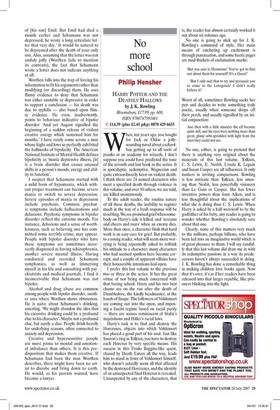No more school
Philip Hensher HARRY POTTER AND THE DEATHLY HALLOWS by J. K. Rowling Bloomsbury, £17.99, pp. 608, ISBN 9780747591061 £14.39 (plus £2.45 p&p) 0870 429 6655 When, ten years ago, you bought for Jack or Chloe a jollysounding novel about a schoolboy getting up to all sorts of pranks at an academy for wizards, I don't suppose you could have predicted the tone of the seventh and last book in the series. It is apocalyptic, redemptive, Wagnerian and quite extraordinarily keen on violent death. I think there are 24 named characters who meet a specified death through violence in this volume, and over 50 others, we are told, are killed anonymously.
To the adult reader, the routine nature of all these deaths, the inability to register much in the way of a fresh response will be troubling. We are promised grief when somebody on Harry's side is killed, and 'screams and cheers and roars' when an enemy dies. More than once, a character finds that hard work is an easy cure for grief. But probably, to a young reader, what will seem more worrying is being repeatedly asked to rethink his attitude to a character; many characters who had seemed spotless here become corrupt, and a couple of apparent villains have their honourable intentions laid open.
I prefer this last volume to the previous two or three in the series. It has the great virtue of not being much concerned with that boring school. Harry and his two best chums are on the run after the death of Dumbledore, the kindly headmaster, at the hands of Snape. The followers of Voldemort are coming out into the open, and imposing a fascist regime based on racial purity — there are scenes reminiscent of Stalin's inquisitions and Hitler's racial laws.
Harry's task is to find and destroy the Horcruxes, objects into which Voldemort has placed a good part of his soul. Just like Sauron's ring in Tolkien, you have to destroy each Horcrux by very specific means. His success in this Frodo Baggins-like quest, chased by Death Eaters all the way, leads him to stand in front of Voldemort himself, who doesn't actually seem all that affected by the destroyed Horcruxes, and the identity of an unsuspected final Horcrux is revealed. Unsuspected by any of the characters, that is; the reader has almost certainly worked it out about six volumes ago.
No one is going to stick up for J. K. Rowling's command of style. Her main means of ratcheting up excitement is through punctuation, and some hectic pages are mad thickets of exclamation marks: Tut you said it, Hermione! You've got to find out about them for yourself! It's a Quest!'
Tut I only said that to try and persuade you to come to the Lovegoods! I didn't really believe it!'
Worst of all, sometimes Rowling sucks her pen and decides to write something truly poetic, usually when someone drops off their perch, and usually signalled by an initial conjunction: And then with a little shudder the elf became quite still, and his eyes were nothing more than great, glassy orbs sprinkled with light from the stars they could not see.
No one, either, is going to pretend that there is anything very original about the materials of this last volume. Tolkien, C. S. Lewis, E. Nesbit, Ursula K. Leguin and Susan Cooper are all influences. It only matters in inviting comparisons. Rowling is less intricate than Tolkien, less amusing than Nesbit, less powerfully visionary than Le GuM or Cooper. She has fewer inventive powers than Joan Aiken, and is less thoughtful about the implications of what she is doing than C. S. Lewis. When Harry is asked by a half-werewolf to be the godfather of his baby, any reader is going to wonder whether Rowling's absolutely sure about that one.
Clearly, none of this matters very much to the millions, perhaps billions, who have been led into an imaginative world which is of great pleasure to them. I will say candidly that this last volume did draw me in with its redemptive passions in a way its predecessors haven't always succeeded in doing. J. K. Rowling has done a remarkable thing in making children love books again. Now that it's over, it's as if her readers have been released into that larger republic, like prisoners blinking into the light.








































 Previous page
Previous page